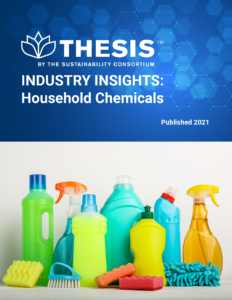Insights report focuses on company THESIS performance in ingredient disclosure, risk assessment and chemical footprint.
4/14/2021, Scottsdale, AZ – The Sustainability Consortium (TSC) released today the THESIS Industry Insights: Household Chemicals report using data from TSC’s The Sustainability Insight System (THESIS). This report is the second report in an ongoing series aimed at using THESIS’ unique data set to raise awareness of key challenges and opportunities in creating more sustainable products. THESIS data from 2019 highlights that companies producing home and personal care products are increasingly implementing practices towards safer products.
Increased consumer interest in the ingredients in their household cleaning products combined with the recently passed U.S. law, called the Sustainable Chemistry Research and Development Act, are driving progress in chemical policies among brands and retailers. Product categories highlighted in the report include:
- air fresheners,
- cleaning wipes,
- dishwashing products,
- household cleaning products,
- laundry detergent and
- fabric softener.
The industry projects more than $50 billion in growth in green chemicals by 2023, and consumers are becoming more aware of studies showing that some of the ingredients in these products can result in human health impacts such as neurotoxicity and endocrine disruption.
Jessica Ginger, TSC senior director, TSC Impact, states, “One of the unique values of THESIS is the ability to compare similar consumer goods side-by-side by issue. This type of insight raises questions like ‘Why are certain products making headway while others are lagging?’ From that point of reflection, manufacturers, retailers, investors, innovators, and everyday people like you and me can begin making smarter, more sustainable choices.”
TSC’s THESIS data shows that many of the companies manufacturing household cleaning products are going beyond legal compliance by engaging in practices such as risk assessment, product safety assessment, and chemical footprinting. Almost half of these companies calculated a chemical footprint and disclosed to the public. Almost 3/4s of these companies are implementing ingredient disclosure to customers even though they are not required to by related legislation.
“THESIS performance assessments helped Church & Dwight make sure over 97% of chemicals of concern are removed from our formulated products. THESIS enables us to effectively measure and quantify the performance of our wide range of products that we are actively working to improve,” states Art Esposito, Sustainability Director, Church & Dwight.
This free report is available for download here. TSC will be releasing similar reports throughout the year. TSC translates the best sustainability science into business tools that are used all over the world to create more sustainable consumer products.
About TSC
The Sustainability Consortium (TSC) is a global non-profit organization transforming the consumer goods industry to deliver more sustainable consumer products. We work to enable a world where people can lead fulfilled lives in a way that decouples their impacts on people and the planet. Our members and partners include manufacturers, retailers, suppliers, service providers, NGOs, civil society organizations, governmental agencies and academics. TSC convenes our diverse stakeholders to work collaboratively to build science-based decision tools and solutions that address sustainability issues that are materially important throughout a product’s supply chain and lifecycle. TSC also offers a portfolio of services to help drive effective improvement and implementation. Formed in 2009, TSC is jointly administered by Arizona State University and the University of Arkansas and has a European office at Wageningen University and Research in the Netherlands. For more information visit www.sustainabilityconsortium.org.
Media Inquiries:
Erika Ferrin
The Sustainability Consortium
[email protected]
480-965-7752

